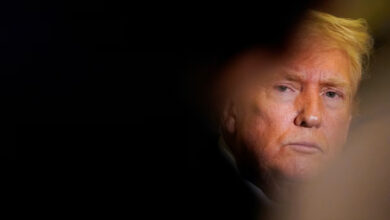A recent fatwa issued by Iran’s supreme leader banning insults to Prophet Muhammad’s wife Aisha will not help ease tensions with the Islamic Republic's Sunni-Arab neighbors, experts say.
Mohamed Megahed al-Zayat, vice-director of the National Center for Middle East Studies, argues that the fatwa is politically motivated and will therefore fail to elicit a positive response from the region's Sunni-Arab masses.
"It's not a general fatwa for everybody–it's not aimed at the Iranians themselves," he said. "It targets the Arabs."
Al-Zayat justifies his argument by noting that Iranian media paid little attention to the fatwa, including Iranian Arabic-language news channel Al-Alam.
"This fatwa has many political objectives," he added, such as telling Palestinian resistance faction Hamas, Iran's Sunni ally, that "Iran's policies are not based on sectarian lines."
In response to questions posed by a group of Saudi Arabian Sunni-Muslim scholars, Iranian Supreme Leader Ayatollah Ali Khamenei ruled that "insulting the symbols of our Sunni brothers, including the Prophet Muhammad's wife, is forbidden. This includes the women associated with all prophets, and especially those associated with the holy Prophet Muhammad."
Abdel Moaty Bayoumi, professor of theology and philosophy at Cairo's Al-Azhar University, argues that the fatwa is "incomplete" since it focuses only on the Prophet Muhammad's wife Aisha, highly revered by Sunni Muslims, and does not refer to all of the prophet's companions–some of whom are frequently mocked by Shia Muslims.
Nevertheless, Al-Azhar Grand Imam Sheikh Ahmed al-Tayeb, along with other prominent Sunni-Muslim figures,praised Khamenei's fatwa. "I received the blessed fatwa with appreciation," al-Tayeb declared.
Medhat Hamad, professor of oriental studies and Iran expert, views the fatwa as an indication of a "serious transformation" of thinking within the Iranian religious establishment.
"For the first time, Iran’s supreme leader has gone in front of the public to issue a fatwa aimed at easing Sunni-Shia tensions," Hamad said. Hamad believes the fatwa will have a positive effect on the Shia community due to Khamenei's unrivaled influence.
Al-Zayat, however, contested this view, noting that reactions to the fatwa among Iraqi Shias have been less than stellar.
"Iraqi Shia religious leaders, such as Sayyid Ali al-Sistani, haven't reacted to the fatwa in any way," he said. "Most Iraqi Shias will completely ignore the fatwa."
The fatwa comes only a few weeks after bitter remarks against the Prophet’s wife by London-based Shia cleric and political refugee Yasser al-Habib. Al-Habib's comments led to political turmoil in Kuwait, which is home to a sizable Shia minority.
Three weeks ago, the Kuwaiti cabinet, following mounting pressure from Sunni Islamist MPs, stripped al-Habib of his Kuwaiti citizenship because of his disdainful remarks about Aisha and the first two Muslim caliphs, Abu Bakr and Umar.
Aisha, daughter of Abu Bakr, is a highly respected figure among Sunni Muslims. But she is negatively perceived by Shias due to the role she played in attempts to remove Ali, who Shias recognize as the first rightful caliph.
"The fatwa in general is good," said Bayoumi. "I see it as a positive step, even though it doesn't provide a religious basis for banning insults against the Prophet's wife."
Bayoumi went on to assert, however, that Khamenei's fatwa would fail to amount to anything unless it was accompanied by policies aimed at "getting rid of the sectarian views embodied in Iranian policies in places like Iraq and Lebanon."
"The Iranians are practicing a clear strategy of promoting the spread of Shia doctrine," he said. "They combine the political with the religious in an effort to achieve their regional ambitions."
Since the 2003 US-led invasion of Iraq, the sectarian divide between Sunnis and Shias has deepened, allowing some regimes in the predominantly Sunni-Muslim Middle East to accuse Arab Shias of threatening regional stability to serve Iranian interests.
Egyptian President Hosni Mubarak has accused Shia Muslims in the Gulf of being more loyal to Tehran than to their home countries. King Abdullah II of Jordan, meanwhile, has warned of a "Shia Crescent" that has a shadow across the entire region.
The Sunni-Shia divide has had bloody consequences in Iraq, which has a Shia majority, and has led to chronic political and social problems in Saudi Arabia.
Al-Zayat, for his part, says the fatwa can be read within the context of rising political, social and religious tensions in the Gulf States, most of which have considerable Shia minorities.
Last month, Bahrain's Sunni-dominated government accused some Shia activists of establishing a "terror network" aimed at toppling the government and destabilizing the country.
In Egypt, despite a wave of optimism following an agreement this week to resume direct flights between Cairo and Tehran for the first time in three decades, Mubarak has accused Iran of supporting "extremist" forces in the region.
In a recent interview with Egypt's Armed Forces magazine, Mubarak said that Iran "could become part of the solution to Middle East crises, rather than being one of the causes of those problems."
According to Hamad, the differences between Egypt and Iran are "deeply ingrained," since the two states have long held opposing views on core regional issues.
"Egypt is a major ally of the United States, while Iran is an enemy," he said. "What's more, Egypt supports the Israeli-Palestinian peace process, while Iran supports resistance against the Israeli occupation."




